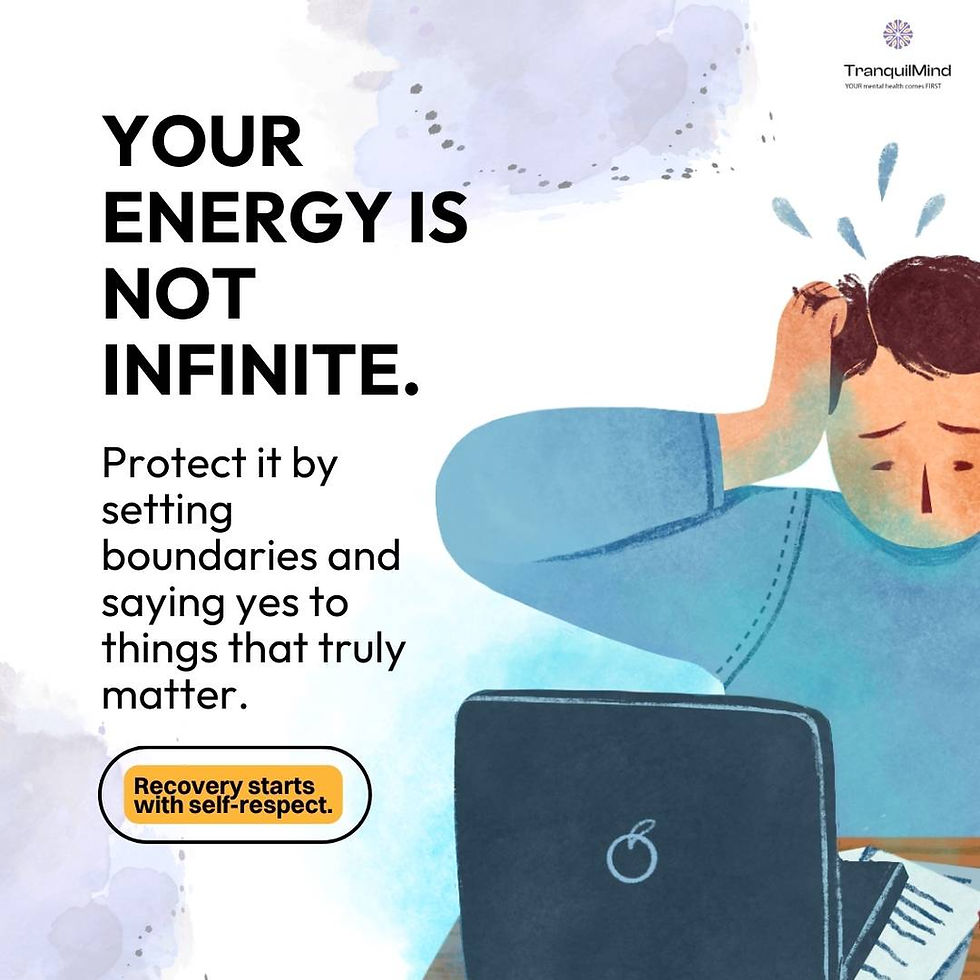Understanding and Managing Emotional Burnout: A Comprehensive Guide!
- Mood Compass
- Nov 24, 2024
- 4 min read
Have you ever felt like you’re pushing through life with an empty tank? Emotional burnout is more than just stress—it’s the profound exhaustion that comes from prolonged emotional strain. If you’re nodding along, don’t worry; you’re not alone. In this guide, we’ll explore emotional burnout in detail: its causes, symptoms, and actionable steps to regain your energy and balance. Let’s dive in and reclaim your inner peace.

What Is Emotional Burnout?
Defining Emotional Burnout
Emotional burnout is a state of extreme mental, physical, and emotional exhaustion caused by prolonged stress. Unlike regular tiredness, burnout leaves you feeling disconnected, unmotivated, and overwhelmed.
Common Signs of Emotional Burnout
Mental Exhaustion: Difficulty concentrating or making decisions.
Emotional Numbness: Feeling detached or indifferent to things you once enjoyed.
Physical Symptoms: Fatigue, headaches, or sleep disturbances.
Cynicism or Irritability: Increased frustration or negativity toward work or loved ones.
"Your well-being matters. You can't pour from an empty cup, so prioritize rest and self-care today."
Why It Happens
Emotional burnout often stems from juggling too many responsibilities without adequate support. Whether it’s relentless job demands, caregiving roles, or even societal pressures, the constant strain takes its toll.
Causes of Emotional Burnout: What’s Draining You?
1. Workplace Stress
Unrealistic deadlines, lack of recognition, and high expectations can sap your energy. When your efforts go unnoticed, burnout is often the result.
2. Personal Life Overload
Struggling to balance relationships, finances, and family commitments creates chronic stress that feeds burnout.
3. Lack of Self-Care
Neglecting your well-being—whether through poor sleep, unbalanced nutrition, or skipping leisure activities—reduces your resilience to stress.
4. Overcommitment
Trying to “do it all” can leave you stretched too thin, especially if you’re juggling multiple responsibilities without adequate support.
5. Unrealistic Expectations
Whether from yourself or others, unattainable goals can make you feel like you’re perpetually falling short.
6. Lack of Work-Life Balance
Endless to-do lists and limited downtime can create a cycle of fatigue that’s hard to break.
"Healing starts with small steps. Take one mindful moment today to pause, breathe, and recharge."
How to Prevent Emotional Burnout: Proactive Steps
The good news? Burnout isn’t a life sentence. Here are practical strategies to help you bounce back:
1. Set Healthy Boundaries
Learning to say no is empowering. Limit your workload and prioritize tasks that align with your values.
2. Practice Mindfulness
Daily mindfulness exercises—like deep breathing or guided meditation—help you stay present and reduce stress.
3. Stay Connected
Lean on friends, family, or support groups for encouragement and perspective. You’re not in this alone.
4. Prioritize Sleep
Rest is non-negotiable. Aim for 7-9 hours of quality sleep every night to recharge your mind and body.
5. Create a Stress Management Plan
Incorporate mindfulness practices, like meditation or deep breathing, into your daily routine to reduce stress and enhance focus.
"Every moment of overwhelm contains seeds of transformation. Your journey through burnout is a powerful narrative of personal growth and renewal."
Managing Emotional Burnout: Strategies for Recovery
1. Recognize the Warning Signs
Acknowledging your limits isn’t a weakness. It’s a step toward healing. Pause when you notice fatigue or irritability creeping in.
2. Break Tasks into Manageable Steps
Feeling overwhelmed? Divide your responsibilities into smaller, achievable goals to regain control.
3. Seek Professional Help
Therapists or counsellors can provide invaluable tools for managing stress. Sometimes, talking it out is the best medicine.
4. Engage in Restorative Activities
Hobbies, exercise, or even a simple walk in nature can rejuvenate your spirit and rekindle joy.
"Burnout is not a sign of weakness—it’s a call to reconnect with what fuels your soul."
The Science Behind Emotional Burnout
Studies show that chronic stress elevates cortisol levels, disrupting your body’s natural rhythms. This imbalance can lead to reduced productivity, memory issues, and even long-term health risks. By actively managing stress, you’re not just preventing burnout—you’re protecting your overall health.
Quick Tips for Immediate Relief
Take a 5-Minute Break: Stand up, stretch, or listen to a calming song.
Journal Your Thoughts: Write down what’s weighing you down to gain perspective.
Breathe Deeply: Inhale for 4 seconds, hold for 4, exhale for 4. Repeat 3 times.
FAQs: Answering Your Burning Questions
1. How do I know if I’m experiencing burnout or just tired?
Burnout is persistent and impacts your emotions, physical health, and motivation. Simple rest often doesn’t resolve it.
2. Can burnout affect physical health?
Yes, it can lead to headaches, digestive issues, and even cardiovascular problems if left unaddressed.
3. Can I recover from burnout on my own?
Mild burnout can often be managed through self-care and lifestyle changes. However, severe cases may require professional help.
4. What are some quick ways to de-stress?
Deep breathing, short walks, or engaging in a hobby can quickly alleviate stress.
5. How long does it take to recover from emotional burnout?
Recovery varies but often requires weeks to months of consistent self-care and support.
6. Can mindfulness really help with burnout?
Yes, mindfulness reduces stress and improves emotional resilience, making it a powerful tool against burnout.
Let us Wrap Up: Take Control and Thrive
Emotional burnout is a signal, not a failure. It’s your body and mind asking for balance and care. By recognizing the signs and embracing proactive strategies, you can not only recover but thrive. Remember, small changes can lead to transformative results. Start your journey to well-being today!
How can we Help?
If burnout is weighing you down, don’t wait to take action. Explore our Healing & Wellness resources or schedule a consultation with our experts today. Your mental health matters and help is just a click away.




Comments